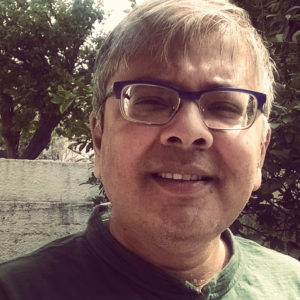
Indian journalist and author of three books Aditya Sinha is a man who likes to remain behind the scenes. He moderated discussions between retired Lieutenant General Asad Durrani and Amarjit Singh Dulat, the two former spymasters of Pakistan and India respectively, in Istanbul, Bangkok and Kathmandu. Their discussions eventually resulted in the publication of a recently released book The Spy Chronicles: RAW, ISI and the Illusion of Peace. The controversial book has stirred up a political hornet’s nest in Pakistan, provoking the Pakistani Army to summon Durrani to General Headquarters (GHQ) Rawalpindi to “explain his position on views attributed to him”. The name of a former Inter-Services Intelligence (ISI) chief, retired Lt Gen Asad Durrani will be placed on the no-fly list, the Inter-Services Public Relations (ISPR) announced on 28 May.
Gowhar Geelani interviewed Aditya Sinha to know his views about the book and Pakistan’s swift decision to place Durrani’s name on Exit Control List (ECL). Here are the excerpts:
Q. It is not unfair to say that you are behind the stage actor, how was your experience of moderating discussions between the two spymasters of rival nations, Amarjit Sigh Dulat and General (retired) Asad Durrani, in Istanbul, Bangkok, and Nepal?
Aditya Sinha: It is true that I am a supporting actor; no one is going to buy this book simply because I wrote it, but because they want to hear the former chiefs of two intelligence agencies of bitterly hostile neighbours who are locked in a 71-year-old dispute over Kashmir.

Author Aditya Sinha
For me, it was a unique privilege and experience. I saw it as a journalistic exercise that was not only unprecedented but also was unlikely to be replicated any time soon. In a sense, I was writing a historical document.
I was deeply impressed by the deep analysis in the discussions. Obviously, if you become a spy chief then you are tasked strategic intelligence by your highest quarter, and you come to think in a deep way. Durrani is considered the most cerebral ISI chief ever, and in the discussions it came across and I was amazed.
Q2. Aditya, you are also the man who compiled A.S. Dulat’s memoir Kashmir: The Vajpayee Years, how was the latest experiment of compiling spy chronicles of two spymasters of the ISI and R&AW different from your first experiment?
AS: That was mostly a memoir, and it involved questioning Dulat about his experiences and events he had witnessed, and then untangling them and putting them into a chronology and in a narrative that would be fast-paced and engaging. I did not want that book to fall into the trap that other bureaucratic memoirs suffer from, which is boredom and self-importance, and it worked. Many people liked the book for its accessibility, and I derive personal satisfaction from that.
This was a different ball-game because there would be no chronology. The two spymasters had collaborated before on joint papers, but they were academic in nature and not much fun to read. I suggested the format of the interview/dialogue and though they were more interested in exchanging emails with each other, I argued that such an approach would have little spontaneity or energy. To their credit they agreed.
Again I hear praise that the book is fast-paced and easy to read. Even my aunt said so! I credit that to the format and my editing of the book from the 170,000 words of transcript I had collected to the 83,000 word manuscript I submitted to the publisher.
Q3. Asad Durrani has been put on ELS by Pakistan and also a court of inquiry initiated by Pakistan’s military against him, what are your thoughts about it from a personal point of view?
AS: I feel sad. When I first heard of the summons to GHQ, it was on twitter at half past midnight in India (I guess just before midnight in Pakistan), and I couldn’t sleep the next three-four hours.
I always presumed that his establishment knew about his contacts, and that he would not have jumped into this project without some sort of tacit approval. A soldier who has followed a disciplined life for 60-odd years would not act recklessly (and in any case, this project took two years to bear fruit, so he had plenty of time to opt out if he had got a signal to do so from his establishment). Perhaps they did not anticipate the controversy to be so intense, or perhaps they wanted to set an example of him, I don’t know.
His not being able to leave Pakistan upsets plans for the launch of the book in London and other places.
It is the intelligence agencies who, by the low-profile nature of their work, can sort out knotty issues between governments.
Q4. Were any state secrets revealed by the two spymasters or do you think their experience of working as intelligence chiefs in two different nation states is helpful for both countries to learn lessons from the past?
AS: I can tell you that no operational matters or details were revealed by either gentleman, and that no state secrets were revealed. I can’t consider the Kargil excerpts as secret – it was Durrani’s professional opinion that Kargil was a foolish operation, not a state secret.
[pullquote]The Kashmir Press exclusive interview[/pullquote]
It definitely is helpful because of two things: for India, if you go by the logic that the ISI is the state within the state, then it is absurd not to engage it. Second, it is the intelligence agencies who, by the low-profile nature of their work, can sort out knotty issues between governments. For instance, I read somewhere that it were the spy chiefs of North and South Koreas who worked for the historic meeting at the DMZ.
Q5.Your professional proximity with the two D’s has now introduced you more to the Kashmir dispute aswell, how was the process of knowing about the many layers of the Kashmir story?
AS: Sorry, I was introduced to Kashmir before I met either gentleman. In fact, my visits to the Valley and my reporting from there prompted a bureaucrat to suggest to me that I meet Dulat, a senior Intelligence Bureau man  who reputedly thought out-of-the-box on Kashmir (at least in relation to the rest of India’s bureaucracy).
who reputedly thought out-of-the-box on Kashmir (at least in relation to the rest of India’s bureaucracy).
I have from the start felt empathy for the Kashmiri plight. They have genuine political grievances. To live the way they have had to since 1990 is suffocating. It is an open prison. New Delhi’s approach is morally reprehensible.
Q6. Unlike Europe, India and Pakistan do not have a rich history of producing spy chronicles and memoirs. Why do you think the two countries are jittery and perhaps over sensitive about such issues? And do you think it also shows intolerance?
AS: I think it would have been possible if South Asia’s literary traditions had not died decades ago. Also, officialdom in India and Pakistan is severely constipated. Officials and spies and soldiers are all intellectually timid. Forget about the BJP, no administration has tolerated dissent. Our think tanks do not widen debate, but only serve to parrot the party line.
Jitteriness is an obvious sign of insecurity.
Q7. What is your take away from the Spy Chronicles as an author, moderator and journalist?
AS: I think this has already been answered.

Journalist Gowhar Geelani
Q8. Do you have plans do more of this stuff in the future?
AS: I think I’m done with the spy business for now. I have an interest in spending some time in the Valley and perhaps doing my own project there.
Q9. Some more thoughts on how Mr Durrani has been treated by Pakistan after the book came out? The release of the book has sparked controversy and accusations of treachery against the former spy chief after his candid views on matters related to regional and global concern came under intense public scrutiny?
AS: After seeing the controversies in Pakistan on Twitter, I am reminded that our populations on both sides are dominated by boneheads. I am baffled that a retired three-star general, who served his country in two wars and who was ambassador to two important nations, could be suspect in anyone’s mind in Pakistan. This betrays great insecurity. I hope things work out in the end, Inshallah!
Q 10. Do you get enough credit for writing these books or you think you are happy being behind the scenes, an unsung hero?
AS: The success of the book is enough for me. Other things will naturally follow.
